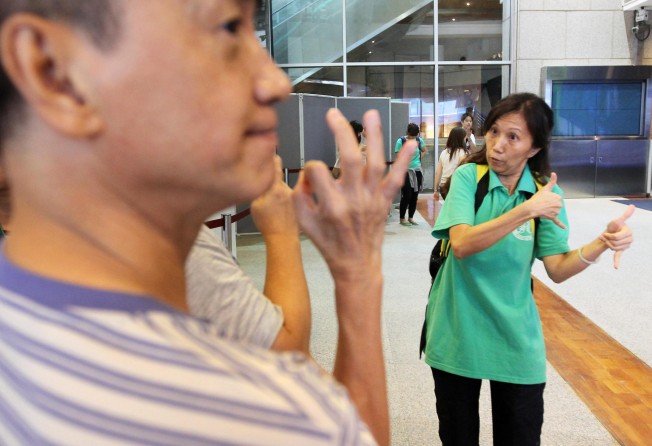Hong Kong's 100,000 deaf people rely on just 10 hand-sign translators
Hong Kong's 100,000 hearing-impaired people are being catered for by just 10 hand-signers

Hong Kong's 100,000 deaf people are suffering from an acute shortage of hand-sign translators.
The executive director of the Hong Kong Association of the Deaf, Adam Ng Ying-yung, said about 9,200 of those were profoundly deaf, but there were only 10 qualified translators operating full-time to help them.
"Without sign language, deaf people cannot survive. It's a way to communicate, to express and to learn," Ng said.
He added that more translators were needed desperately, and that sign language should be incorporated into the education system.
Video: Sign language interpreter for the hearing impaired
A deaf couple almost had to call off their wedding this year because they were unable to communicate with the registrar. The day was saved when translator Mindy Lai Man-chung arrived and taught them the vows.
"The acute shortage of translators is a big problem for [the deaf community], who may need translation for the simplest of daily tasks, like seeing the doctor or going to a parent-teacher meeting," she said.
"I sincerely want to encourage the public to learn basic signing. Whatever job you're in - could be a salesperson - it would help deaf people feel much more welcome and included."
Lai has been a translator for 15 years and spends her days operating in a wide range of situations - from hospital appointments to wedding ceremonies, parent-teacher meetings in schools, and court cases.
"Once I went all the way to Lau Fau Shan [in the New Territories], but only translated for three minutes," Lai said.
Ng said one problem was the lack of an official translator assessment.
The Hong Kong Council of Social Service helped launch an open assessment in 2007 but stopped after three years when funding was withdrawn.
Only 10 passed the assessment and were accepted as court translators. Lai is one of them.
Lessons in sign language were provided by only five big deaf-services NGOs, Ng said. Also there is no official sign language in Hong Kong.
Ng said it was important for sign language to be recognised as a language, as it would give it legitimacy to be used in school classrooms.
"It's a mess actually," he said of the lack of research and development and resources given to sign language. "In the meantime, deaf people can only queue up and book available translators for their needs."
PART TWO: the problem facing deaf people who cannot use sign language - coming soon